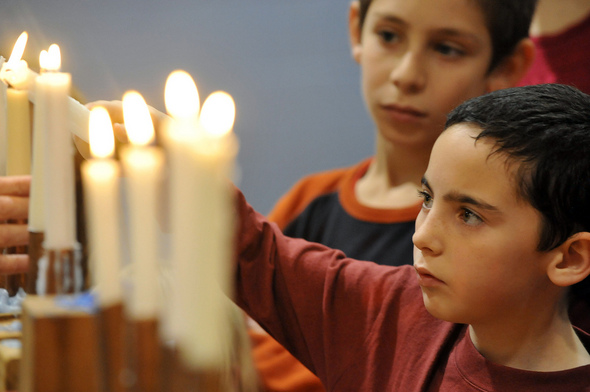Hanukkah, the Jewish festival of lights, 'a time of joy'

Noah Rosenzweig and Avi Covrigaru light menorah candles at the Hanukkah Celebration at the Jewish Community Center on Dec. 13, 2009.
Mark Bialek | AnnArbor.com
Hanukkah, the Jewish festival of rededication, also known as the festival of lights, began this year with the lighting of the first menorah candle Wednesday.
Hanukkah is probably one of the best known Jewish holidays, but it is of relatively minor religious significance for the Jewish community, according to Judaism 101.
"It's a time of joy," said Rabbi Kim Blumenthal of Ann Arbor's Beth Israel Congregation. There are no work restrictions that occur during some of the more religiously significant Jewish holidays, because it's a "post-Biblical holiday," said Blumenthal. Hanukkah is not mentioned in the Jewish scriptures but is recorded in the book of Maccabees.
The first day of Hanukkah can fall anywhere between Nov. 28 and Dec. 26, according to the Jewish calendar.
The Hanukkah story begins in the times of Alexander the Great, according to Judaism 101. Under Alexander's rule, many Jews assimilated into Greek society. But more than a century later, Antiochus IV began severely oppressing the Jews, prohibiting the practice of their religion and desecrating the Temple. Several Jewish groups, including the Maccabees, led a revolt against the Greek oppression, and the temple was rededicated.
Judaism 101 explains that according to tradition, there was only one day's worth of undefiled oil remaining at the time of the rededication, but the menorah (candelabrum) in the temple was supposed to burn throughout the night. In what came to be regarded as a miracle, according to the story, the menorah burned for eight days, just enough time to prepare a fresh supply of oil. An eight day festival was declared to commemorate the event.
Hanukkah traditions include lighting a menorah that holds nine candles: one for each night, plus a shammus (servant) candle at a different height. Temple Beth Emeth on Packard Road holds a special family service at 7:30 p.m. on Friday, Dec. 3, when everyone brings a menorah from home to light from the large temple menorah.
"It's so beautiful to see all the menorahs lit together at the front of the Temple," said Ronnie Simon, executive director at Temple Beth Emeth. "We all come together for one special service to celebrate the third night of Hanukkah together."
Latkes (potato pancakes) and other fried foods symbolize the significance of the oil, and children play the dreidel, a gambling game with a square top. Rabbi Blumenthal explained that the letters on the dreidel have a dual significance. While indicating the amount won or lost in the game of chance, they also spell a message: "A great miracle happened here" within Israel, or "A great miracle happened there," outside Israel, referring to the miracle of the oil.
Gift giving on the eight days of Hanukkah is a more modern tradition.
Pam Stout coordinates Faith and Home & Garden coverage for AnnArbor.com. She can be reached at pamstout@annarbor.com.

